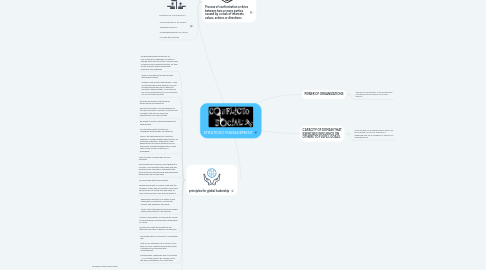STRATEGIC MANAGEMENT
by RAFAELM ENDOZA


1. Process of confrontation or drive between two or more parties caused by a clash of interests, values, actions or directions
1.1. Intergroup conflict in organizations
1.1.1. Behavior that occurs between organizational groups, when participants identify with a group and feel that others can block the achievement of their goals or expectations
1.2. SOURCES OF THE CONFLICT -INCOMPATIBILITY OF GOALS -DIFFERENTIATION: -INTERDEPENDENCE OF TASKS -LIMITED RESOURCES
2. principles for global leadership
2.1. Understanding the importance of non-conformity Leadership consists of change, hope and the future. Leaders have to venture into unfamiliar territory, so they must be able to handle intellectual loneliness and ambiguity
2.2. Show a commitment to learning and developing oneself Leaders must invest in themselves. If you do not have the proper training, you can not help people who do not have the necessary training either. If you are sick, you can not treat the sick; If you are poor, you can not help the poor.
2.3. Develop the ability to put personal performance in perspective During a long career, you will experience success and failure. Humility in success and courage in the face of failure are characteristics of a good leader.
2.4. Be willing to invest in the development of other people Do not spare efforts to help your colleagues develop their full potential. Office: The development of collective capacity is multiple greater than the sum of individual capacities. Investment in the development of people becomes one of the efforts with the greatest return in the team model of the current era of knowledge.
2.5. Learn to relate to those who are less fortunate Good leaders are inclusive, even though it is not easy. Most societies have dealt with the differences by avoiding or eliminating this type of person; few are those who assimilate people who are not like them.
2.6. Be concerned about due process People seek equity-no favors. They want to be heard. Often, they do not even care if the decisions do not follow the right path, as long as the process is fair and transparent.
2.7. Realize the importance of loyalty to the organization, profession, community, society, and especially the family. Most of our achievements are not possible without the support of our families.
2.8. Assume responsibility for the results, as well as the processes and the people with whom you work The way you meet the objectives will determine the type of person you become.
2.9. Remember that you are part of a privileged few That is your strength, but it is also a cross that you carry. Balance performance with compassion and learning with understanding. Oficiationate: Leading by and for the team ... It is not the same to go forward, go to the side, go between, go on the team
2.10. Remember that you are part of a privileged few That is your strength, but it is also a cross that you carry. Balance performance with compassion and the apprentice. Wait to be judged for what you do and how well you do it, not for what you say you want to do However, the bias towards action must be balanced by the empathy and care of other people.
2.10.1. Be aware of the role you play Be concerned about the problems of the poor and disabled, accept human weaknesses, laugh at yourself and avoid the temptation to play God. Office: Again the concepts of diverse team and inclusive team appear. Both are also the insurance policy that the leader must have contracted to prevent himself from egotistical temptations. Living in and with the team, in a process oriented to development, to the challenge and continuous progress, is the cure of humility that avoids complacency.
